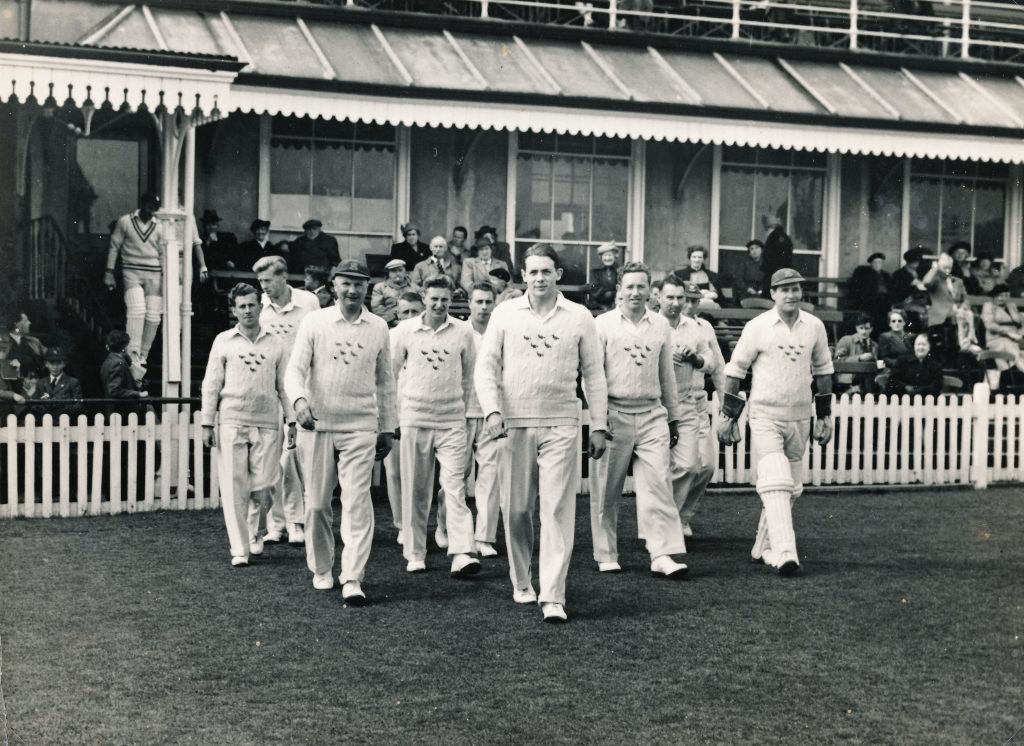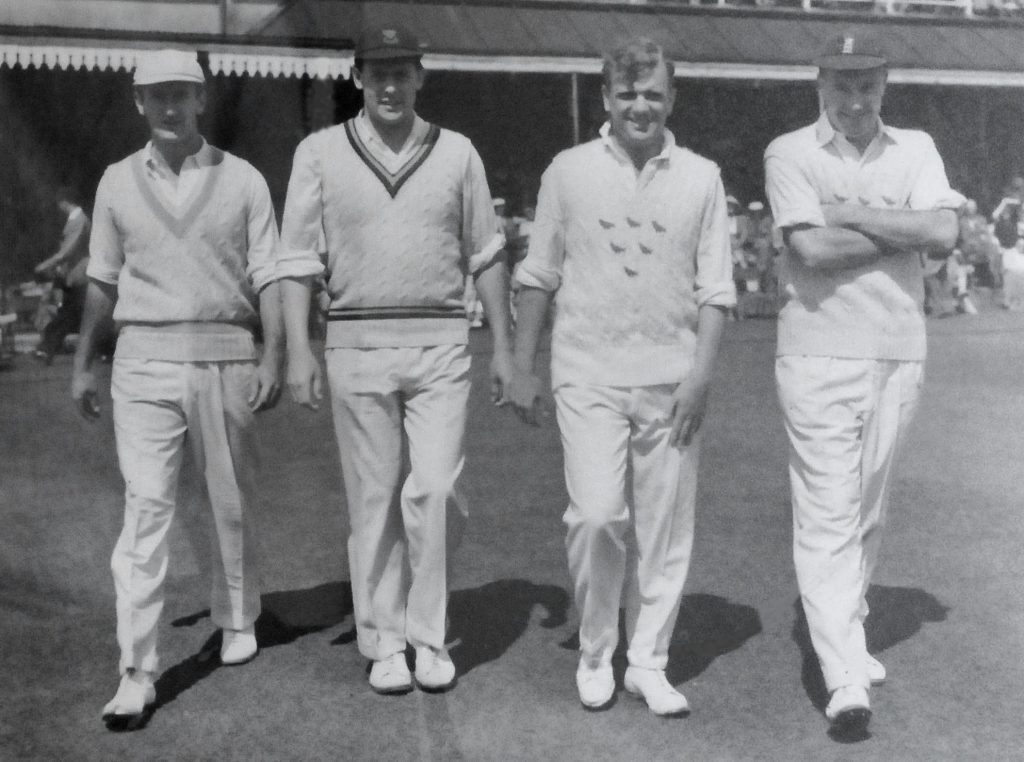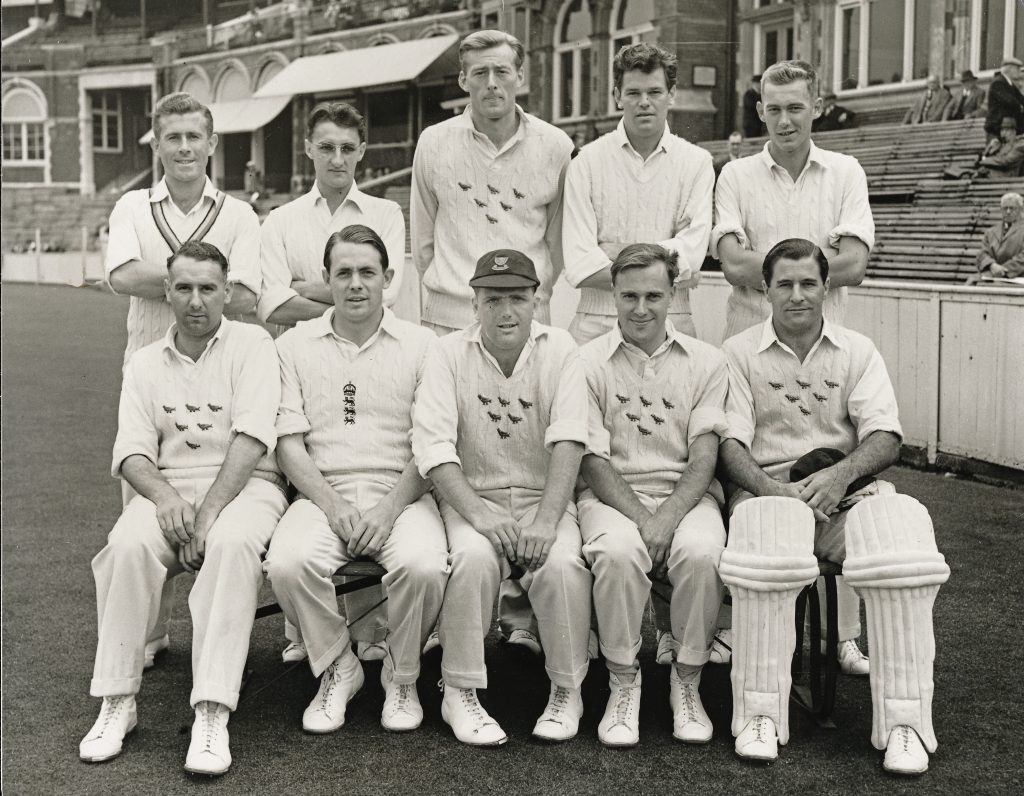An inspiring county captain
David Sheppard was born in Reigate on 6 March 1929, Surrey to Stuart Sheppard and Barbara Shepperd. Following the death of his father in the late 1930s the family moved to Sussex. He might have been one of the all time batting greats of the post-war era but his time in cricket was short for he became a bishop, a member of the House of Lords and a campaigner for the underprivileged. During his short cricketing career though he had a good Test career and was an inspiring county captain.

Over 900 runs in his first season
Sheppard was educated at Northcliffe House School in Bognor Regis and then at Sherborne School, Dorset where his cricketing talents were discovered. He had his first match for Sussex at the age of eighteen in 1947 – against Leicestershire – but was lbw first ball. After doing his National Service in the Royal Sussex Regiment he returned to Sussex for the 1949 season, playing eleven matches and making over 900 runs, including 204 against Glamorgan and 147 against Leicestershire, joining John Langridge in an opening stand of 238. He was awarded his county cap in August and in October went up to Cambridge to read history at Trinity Hall.
At Cambridge, in 1950 he scored over 1,000 runs for the university, scoring four centuries in the process, including an opening partnership of 343 with John Dewes against the West Indians at Fenner’s of which Sheppard contributed 227. He was called up for the Fourth Test at the Oval when Cyril Washbrook was unfit and ended his season just 15 runs short of 1,900.

Top of the national batting averages
Sheppard did well over the next few seasons for Sussex, heading the national batting averages in 1952 scoring nearly 2,300 runs with ten centuries, including the highest score of his career – 239 not out for Cambridge Worcestershire. In 1952 Sheppard scored 1,212 runs in just twelve matches for Sussex, including 174 out of 294 against Kent in the first innings and 90 not out in the second innings out of 203. Against the South Africans he scored 100 out of 213. With the likes of Sheppard, Marlar and Doggart joining the team once the summer holiday shad begun, there were seven wins in the last 11 games
A Test century
Sheppard was a member of the side that toured Australia in 1950/51 and played in two Tests but did not play against for England until the Third and Fourth Tests against India in 1952 when he scored his first Test century, 119 at the Oval.
In 1953 Sheppard decided to take Holy Orders but took over the Sussex captaincy in a side that seemed ready to fulfil the dreams of all Sussex supporters, but the team made a poor start but by June was leading the Championship. Too many drawn matches later in the season though put paid to the hopes of the supporters and the team as first place was taken by the very strong Surrey team. Sheppard did though score over 2,000 runs with seven hundreds. As a county captain Sheppard was inspirational, lifting the players by his personal example and encouragement on and off the field.
In 1954, Doggart took over the captaincy and Sheppard played quite regularly but his appearances were becoming more and more infrequent due to his pastoral duties. He did captain and open the batting for England in two Tests against Pakistan in the absence of Len Hutton. There was talk that Sheppard might lead the MCC side that toured Australasia in 1954/55 but in the event that task went to Hutton.
Working in the East End
Sheppard played little cricket in 1955 but in 1956 Sheppard ‘s form for Sussex, 471 runs in fourteen innings, was recalled to the England team to play Australia in the Fourth (Laker’s match) and Fifth test Matches and made 113 at Old Trafford becoming the first ordained pries to play Test cricket.
From 1957 until 1969 Sheppard was Warden of the Mayflower Centre in London’s East End. He played very little cricket during these years but in 1962 he began to play a little more and a hundred for the Gentlemen led to his selection for the 1962/63 tour of Australia and New Zealand.
A sabbatical to play cricket in Australia
Shepard took a sabbatical from his work at an East End mission to be a part of the tour which was led by his Sussex teammate Ted Dexter. Sheppard scored over 1,000 runs, played in a further eight Tests and made 113 during the victorious Second Test in Melbourne. He did though drop a number of vital catches leading Fred Truman telling him “The only time your hands are together are on Sundays” although what was actually said has changed over the years. This though was his finale. His ability to make big scores when it mattered on the Test stage, at times when he played little county cricket, was a tribute to his powers of concentration and his attention to detail. He had to work hard to achieve what he did, not being blessed with the natural talent of others, but he was a commanding presence on the field.

An opponent of apartheid
Sheppard was a strong opponent of apartheid, signing with others, a letter to The Times on 17 July 1958 opposing the policy of apartheid in international sport. In 1960 when the South Africans were touring Britain, Sheppard refused to play against them. When the MCC proposed a tour to South Africa, and the South African government opposed the inclusion of Basil D’Oliveira, Sheppard was a vocal opponent of the tour.
Following his complete retirement from cricket Sheppard went on to become Bishop of Woolwich in 1969 and Bishop of LIverpool in 1975. He retired in 1997 and in the 1998 New Year Honours list was given a life peerage, taking the title, Baron Sheppard of Liverpool. In 2001 Sheppard was named as President of Sussex CCC.
The official biography of David Sheppard, Batting for the Poor was published on 21 November 2019.
Sussex Record, 1947-1962
Batting: M:141, I:247, NO:23, Runs: 9545, Ave: 42.61, 100s:27